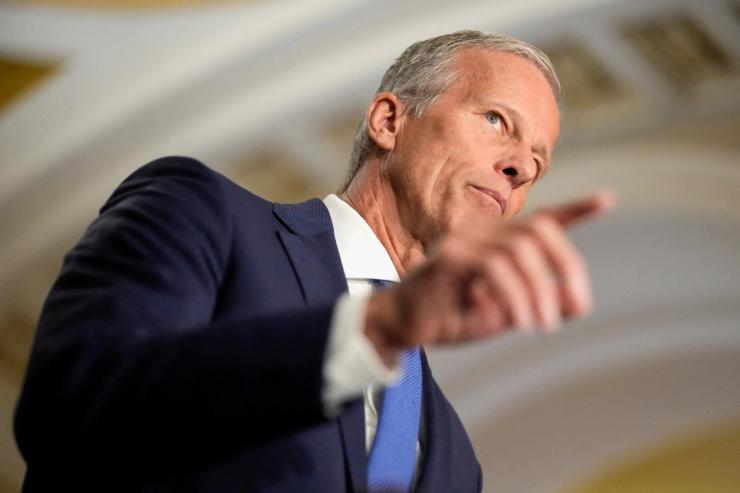The News
John Thune compares asking for money to “chewing on tinfoil.”
When he’s not pushing President Donald Trump’s agenda through the Senate, he’s doing a lot of it.
After winning the race to succeed Mitch McConnell, the South Dakota Republican didn’t just claim the job of Senate majority leader. He also assumed control of a vast constellation of Republican political machinery that his predecessor meticulously built over two decades.
“Mitch had a brand, and people trusted him,” Thune told Semafor in a Thursday interview at the National Republican Senatorial Committee. “There are big shoes to fill.”
Not only does Thune oversee the Senate Republicans’ campaign arm alongside its chair Tim Scott, R-S.C., but he also steers the Senate Leadership Fund, a super PAC that does much of the party’s heavy lifting in Senate races.
Plus, he’s navigating the midterms alongside Trump after undertaking one of the most significant transitions in modern politics.
Though Thune had raised millions of dollars for his party in the past, he’d never chaired the NRSC. It was one of Thune’s liabilities in the race for leader last year as he squared off against two former NRSC chairmen.
But the new majority leader has started to prove himself already at what he admitted is a “daunting” task, with SLF and its affiliates doubling their off-year fundraising to $85 million.
“John Thune has earned the respect of the Senate conference in a way that I think has even surprised some of the few detractors that were out there,” said Sen. Steve Daines, R-Mont., who served as NRSC chair last Congress.
One thing Thune said that “probably” helps: his relative anonymity on the national level. He’s not yet an attack-ad magnet on par with McConnell or Senate Minority Leader Chuck Schumer, D-N.Y.
That may change after this cycle. He’ll be an active surrogate on the trail and is lending his name more often than McConnell to the party’s digital fundraising efforts, according to a person familiar with internal tallies.
In another shift, Thune and the NRSC are issuing routine joint endorsements of challengers like former RNC co-chair Michael Whatley in North Carolina, former Rep. Mike Rogers in Michigan, and Sen. John Cornyn in Texas in his primary against Texas Attorney General Ken Paxton.
Trump has aligned himself with Thune on Whatley and Rogers — but not yet on Cornyn or Sen. Bill Cassidy, R-La., the latter of whom voted to convict Trump in his 2021 impeachment trial.
Thune’s making his case for Trump to back Cassidy and Cornyn, who’d previously questioned the president’s ability to win. And he said that he “might have” asked Trump to endorse Sen. Mike Rounds, R-S.D., who Trump has previously criticized.
“We’ve made it very clear where I am, for Cornyn and for Cassidy,” Thune said. “I’m hoping at some point that the president perhaps will find his way to get there.”
Cornyn was Thune’s top rival in the leadership race last year; he’d campaigned hard on his two-time chairmanship of the NRSC. Even so, Cornyn didn’t even have to ask Thune to have his back.
“Call it karma, but all the stuff that I’ve done over the years to help the NRSC and the team is coming back to me now,” Cornyn said. “I can’t remember even asking [for an endorsement]. I mean, it was relatively instantaneous.”
In this article:
Know More
Thune is a lanky former collegiate athlete who, at 64 with six grandchildren, can still do a backflip into the Missouri River. He’s finding that flexibility of a less physical nature is critical for his job, too.
The party has already faced the surprise swing-state retirement of Sen. Thom Tillis, R-N.C.; Whatley is now its consensus pick to take on former Democratic Gov. Roy Cooper.
Asked about Tillis, Thune said he was “disappointed when you lose an incumbent like that that has a record of winning close races,” but predicted Whatley would be able to raise money and keep unified Republican support. He acknowledged Cooper could be “formidable” but said Republicans would portray the former governor as “very liberal.”
Tillis told Semafor that the party’s new tax law will animate Democratic attacks, particularly on its Medicaid cuts. He said he’s “worried about just the cost to overcome what will be a lot of fodder for the Democrats against us.”
Thune countered Republicans can just as easily use the bill’s more popular tax breaks against Sen. Jon Ossoff, D-Ga., or other Democrats who opposed it: “There are so many ads in that bill, if you’re a Republican.”
Still more curveballs await Thune as the campaign continues. Georgia Gov. Brian Kemp’s decision not to run against Ossoff left the GOP with a wide-open Senate primary. Already Reps. Buddy Carter and Mike Collins are in the race, and former college football coach Derek Dooley is looking at it.
Thune is not looking to make a call yet.
“Derek Dooley is somebody that there’s a lot of buzz around, and sounds like it’s very possible he gets into the race here soon,” Thune said. “We’ll see how it goes, how it develops, and what the president there decides to do.”
Thune is also urging Sen. Joni Ernst, R-Iowa, to run again and said it shouldn’t “be too long before she makes a decision.”
He and other top GOP officials remain confident that Sen. Susan Collins, R-Maine, will run for reelection despite recent breaks with the party. Collins said Thune “wants the conference to be together as much as possible. And he respects that our states are all different.”
Democrats need to pick up four seats to win the majority, not an easy task given that the GOP has a favorable map. To blunt Democrats, Thune has brought in former Sen. Cory Gardner, R-Colo., and former Trump staffer Alex Latcham to run SLF; he also has his own political staffer in the NRSC offices.
Still, Thune said Republicans need to make sure that Trump’s faithful turn out for non-Trump candidates, after their Senate nominees fell short last year in several states that Trump won.
“If the Trump voters who turn out to vote for president don’t come out in a midterm election, that certainly could be problematic for us, but we learned a lot of lessons,” Thune said. “We have developed a more disciplined way of reaching low-propensity voters.”
Room for Disagreement
Democrats are licking their chops at the overall poor polling of the GOP’s “big, beautiful bill.” Schumer told Semafor recently that his party’s message would be “they’re cutting your health care, or they’re cutting your job, to give tax breaks to billionaires.”
Lauren French, a spokeswoman for Democratic group Senate Majority PAC, said despite the favorable map for Republicans, Thune “had to sell his soul to Donald Trump to get the job.
“And then [Brian] Kemp bailed, Ernst desperately wants to quit, and Cornyn vs. Paxton could be the nastiest fight of the cycle,” she added.
Burgess’s view
The “honeyThune” is still going six months into this Congress, with every corner of the party pleased by the majority leader’s work so far. But the midterms will tell the tale.
Thune put his own fingerprints on Trump’s tax and spending cuts bill, tilting it to the right. If voters reject it, it will raise questions about those policy decisions.
But if Thune can limit Senate losses to one or two seats — or even increase his majority — it could cement him as a long-term leader. He’s already shown adeptness at working with Trump, which wasn’t always a given, and there’s been no dropoff from McConnell on fundraising so far.


